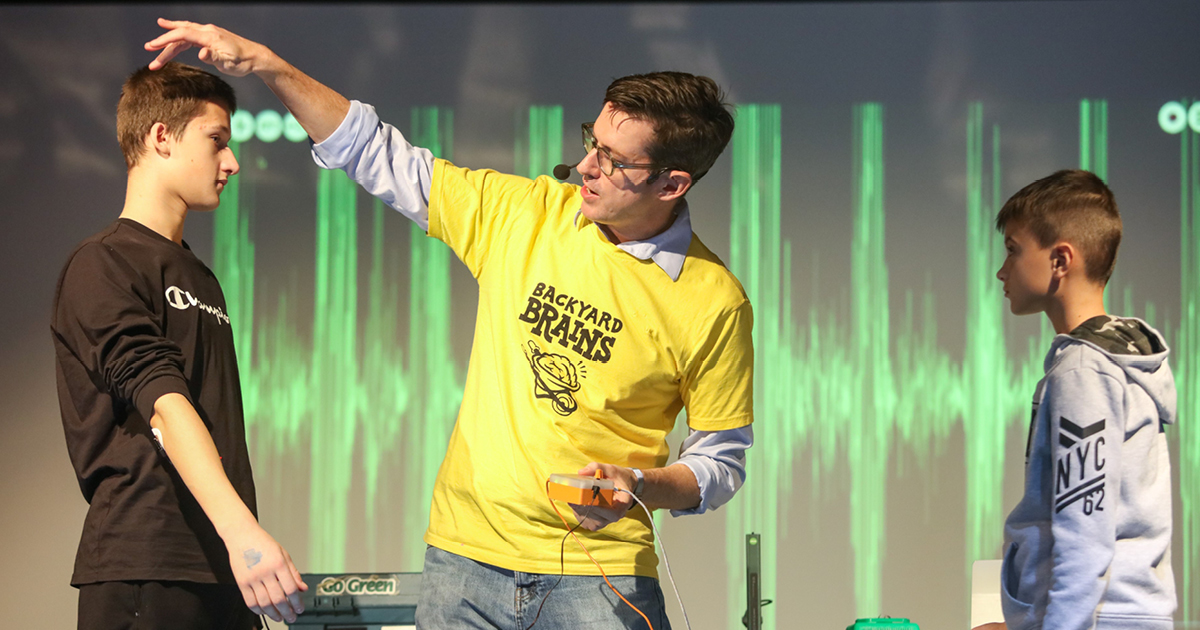Unraveling the Brain

Unraveling the Brain
When it comes to education, neuroscientist, inventor and business owner Greg Gage, ’94, uses his imagination to make brain science accessible to all.
February 25, 2024The brain is an amazing and complex organ,” begins Greg Gage on the stage of his most-viewed TED Talk,
filmed in 2015. “And while many people are fascinated by the brain, they can’t really tell you that much about the properties [of ] how the brain works because we don’t teach neuroscience in schools.”
In a video totaling more than 23 million views on YouTube, the bespectacled speaker then asks a volunteer to join him onstage. He attaches electrodes to her arm which are affixed to the Spikerbox—an invention concocted by Gage to help educate everyday people about the wonders of the brain. The Spikerbox shows the activity of live neurons, visualized by sounds and spikes on a smartphone screen, similar to how seismographs measure earthquakes.
When Gage tells her to curl her arm, the spikes react sharply. The crowd gasps. “These are the motor units that are happening from her spinal cord out to her muscle,” Gage explains, “and as she’s doing it, you’re seeing the electrical activity that’s happening.”
But he’s not done. He invites another volunteer to the stage and attaches a separate set of electrodes to his arm. With both volunteers connected to the same device—Gage calls this human-to-human interface—he asks the first volunteer to squeeze her hand. And when she does, the second volunteer’s hand suddenly curls up too.
The crowd erupts in shocked laughter. “You know, when you lose your free will, and someone else becomes your agent,” Gage says, “it does feel a bit strange.” He’s gone on to appear on seven more TED Talk or TEDx stages.
A mix of wonder and joy is par for the course for Gage, who regularly elicits these expressions from audiences since he founded Backyard Brains, an organization focused on DIY experiments to teach the public about how our brains work.

“Democratizing science is what Backyard Brains is about,” he says in an interview from Serbia, where he’s helping a publisher translate his 2021 book “How Your Brain Works: Neuroscience Experiments for Everyone,” written with his Backyard Brains co-founder Tim Marzullo. “And one thing critical to what we do is that we don’t take ourselves too seriously, like when we give talks. I think a lot of scientists can learn from that.”
An adjunct assistant professor of molecular and integrative physiology at the University of Michigan, Gage spends most of his days visiting classrooms and conference halls to share nuances of brain science in interesting and inventive ways.
Gage is quick to comment about what he thinks the education system got wrong about neuroscience. “You read about it in a book and a lab class and then recreate what the sheet says, and let’s be honest, not many people can learn science that way.”
But some departments get it right. Gage remembers an MSU physics class that lit a fire under him. “I had my first ‘Is everybody else hearing this?’ moment when learning about electrons and how strangely yet predictably they behaved. The next semester I enrolled as an electrical engineer and fell in love with electronics.”
By blending his passions for device tinkering and breaking down neuroscience in accessible ways, Gage found his calling.
When he thinks about his relationship to science, and what he tries to preach to students young and old, he says, “There is creativity to science, and there is the ability to fail and come right back up again. The next generation of scientists can benefit a lot by tackling uncertain problems and looking beyond securing the best GPA.”
In other words, don’t take it too seriously—learning is meant to be fun. And Gage is living proof.
Contributing Writer(s): David Silverberg




